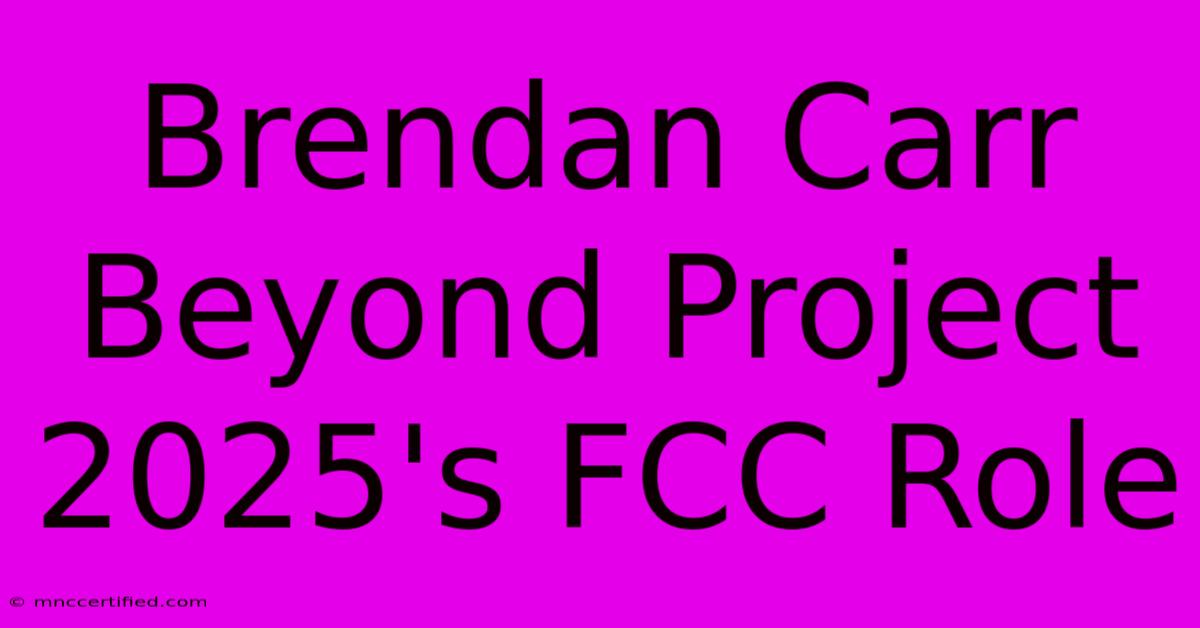Brendan Carr Beyond Project 2025's FCC Role

Table of Contents
Brendan Carr Beyond Project 2025: Examining the FCC Commissioner's Impact
Brendan Carr's tenure as an FCC Commissioner, particularly his involvement in Project 2025, has sparked considerable debate and analysis. This article delves into his role, examining his contributions, controversies, and potential future influence beyond the project's lifespan. We'll explore his key policy positions and their broader implications for the future of telecommunications and media regulation in the United States.
Project 2025: A Deep Dive into Carr's Initiatives
Project 2025, a sweeping initiative spearheaded by Carr, aimed to fundamentally restructure the Federal Communications Commission (FCC). It focused on several key areas:
1. Regulatory Reform: Deregulation and Streamlining
Carr advocated for significant deregulation, arguing that excessive government intervention stifled innovation and competition. This included streamlining the regulatory process, reducing bureaucratic hurdles for businesses, and promoting a more market-based approach to telecommunications. Critics, however, raised concerns about potential negative consequences for consumer protection and the public interest. The debate centered on finding the right balance between fostering competition and ensuring fair treatment for all stakeholders.
2. 5G Deployment and Infrastructure Investment: A Critical Focus
A significant component of Project 2025 involved accelerating the deployment of 5G networks across the United States. Carr emphasized the importance of robust infrastructure investment to maintain America's technological competitiveness globally. This involved facilitating the allocation of spectrum and addressing challenges related to infrastructure deployment, including zoning regulations and permitting processes. His proactive approach aimed to position the US as a leader in 5G technology.
3. Combating Foreign Influence and National Security: A Central Theme
Carr consistently highlighted the national security implications of telecommunications infrastructure and technology. He voiced strong concerns about the influence of foreign entities, particularly China, on the US telecommunications market. This led to initiatives aimed at securing the nation's networks and preventing the use of technology for espionage or other malicious purposes. His focus on national security became a defining feature of his tenure.
Controversies Surrounding Carr's Actions
Carr's assertive approach to regulation hasn't been without its share of controversies. Several decisions and policy proposals drew strong criticism from various groups:
-
Net Neutrality: His stance on net neutrality was particularly contentious, aligning with those who favored a more hands-off approach to internet regulation. This sparked significant public debate, with opponents arguing that deregulation could lead to discriminatory pricing and reduced internet access for some users.
-
Media Ownership: His views on media ownership also generated controversy, with critics expressing concern about the potential impact on media diversity and local news.
-
Enforcement Actions: Specific enforcement actions taken under his leadership faced legal challenges and public scrutiny, highlighting the complexities and challenges inherent in regulating a rapidly evolving industry.
Beyond Project 2025: Carr's Potential Future Influence
Even after the conclusion of Project 2025's formal timeline, Carr's influence on telecommunications policy and the FCC’s direction remains significant. His experience and expertise will likely continue to shape future debates and decisions, regardless of his official role within the agency. His advocacy for market-based solutions, focus on national security, and commitment to regulatory reform are likely to remain prominent themes in future discussions.
Conclusion: Assessing the Legacy
Brendan Carr's impact on the FCC extends far beyond the specific initiatives of Project 2025. His contributions, while sometimes controversial, have undeniably reshaped the landscape of telecommunications regulation in the US. Understanding his policy positions, the controversies surrounding them, and his potential future influence is crucial for anyone seeking to comprehend the evolving dynamics of the American telecommunications industry. Further research is needed to fully assess the long-term effects of his policies on competition, innovation, and consumer welfare. The ongoing debate surrounding his legacy underscores the complexities and challenges of navigating the intersection of technology, regulation, and national security.

Thank you for visiting our website wich cover about Brendan Carr Beyond Project 2025's FCC Role. We hope the information provided has been useful to you. Feel free to contact us if you have any questions or need further assistance. See you next time and dont miss to bookmark.
Featured Posts
-
Pregnant Jennifer Lawrence At Governors Awards
Nov 19, 2024
-
Knox Leon At A Red Carpet Event
Nov 19, 2024
-
Crash Network Insurer Report Card
Nov 19, 2024
-
Minute Maid To Daikin Astros Park Renamed
Nov 19, 2024
-
Art Risk Surrogacy Insurance Cost
Nov 19, 2024